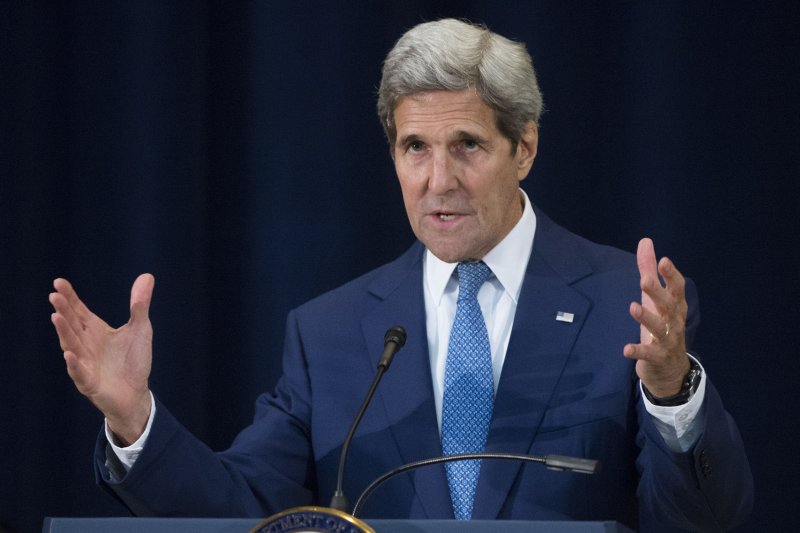1 of 6 | Secretary of State John Kerry delivers remarks at an events releasing the 2015 Trafficking in Persons (TIP) Report, at the U.S. Department of State in Washington, D.C. on July 27, 2015. The TIP Report assesses government efforts around the world to combat modern slavery. This year’s Report, the 15th installment, includes narratives for 188 countries and territories, including the United States. Photo by Kevin Dietsch/UPI |
License Photo
WASHINGTON, July 27 (UPI) -- The U.S. Department of State on Monday released its annual report on human trafficking that determines the compliance of countries to combat the industry, which continues to call out Russia but upgraded Cuba's status.
"Many of these migrant workers experienced exploitative labor conditions characteristic of trafficking cases, such as withholding of identity documents, nonpayment for services rendered, physical abuse, or extremely poor living conditions," the report stated in regards to Russia.
The 2015 Trafficking in Persons Report analyzes the efforts of 188 countries to comply with minimum standards required to eliminate human trafficking for sexual exploitation or forced labor.
Countries are separated into three different levels with Tier 1 being the countries most compliant to standards set to combat human trafficking through Tier 3, the countries who do the least to prevent the "scourge of modern slavery."
Tier 2 has a "Watch List" of countries who will fall into the bottom level if they do not attempt to improve.
"In the year 2015 we have a modern version of slavery... it is vital for us to push back against this," Secretary of State John Kerry said during a press conference. "Like every nation, the United States has responsibility to do a better job protecting those within our own borders."
Human trafficking is an illicit $150 billion industry, according to Kerry. There are an estimated 20 million people around the world believed to be victims of human trafficking.
"We must never, ever, allow a price tag to be attached to the heart, soul, and freedom of a fellow human being," Kerry added.
Tier 1 countries include Australia, Belgium, South Korea, the United Kingdom and the United States.
The countries upgraded from Tier 3 up to the Tier 2 Watch List are Uzbekistan, Saudi Arabia, Malaysia and Papua New Guinea.
Cuba was upgraded up to Tier 2 up from Tier 3. Human rights activists warned that a premature upgrade would be seen as political favoritism and could damage efforts to hold the Cuban government accountable.
Cuba was introduced into Tier 3 in 2003. The report was first introduced in 2001.
Tier 3 countries can be punished at the discretion of the President of the United States. Punishments can include restrictions on non-humanitarian assistance and funding.
In the 2015 report, there are 23 countries in the Tier 3 placement, including Belize, Iran, North Korea, South Sudan, Libya and Russia.
There an estimated five million to 12 million foreign workers in Russia and "prosecutions remained low compared with the scope of Russia's trafficking problem."
Belarus, Comoros and the Marshall Islands were automatically downgraded to Tier 3 after being on last year's Tier 2 Watch List.
Thailand, Venezuela and Gambia were downgraded from Tier 2 to Tier 3 in last year's report and remain in the same ranking in 2015.
"This year's report places a special emphasis on human trafficking in the global marketplace. It highlights the hidden risks that workers may encounter when seeking employment and the steps that governments and businesses can take to prevent trafficking, including a demand for transparency in global supply chains," Secretary of State John Kerry said in a statement. "The bottom line is that this is no time for complacency. Right now, across the globe, victims of human trafficking are daring to imagine the possibility of escape, the chance for a life without fear, and the opportunity to earn a living wage."















